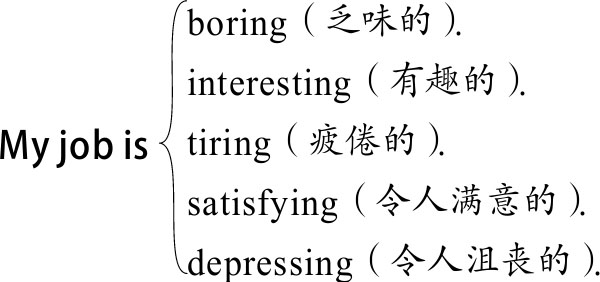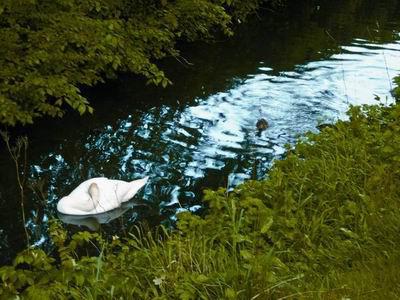 4.4 Interesting or interested?
4.4 Interesting or interested?
4.4.1 -ing形容词与-ed形容词的特点
看到上面标题中的interesting和interested的读者,一定认识这两个单词,而且能够很好地区分这二者的不同用法。比如要说“一本书有趣”,我们就要用interesting说:
1 The book is interesting.
而如果要说“他感兴趣”,我们则要用interested说:
2 He is interested.
或者,我们把二者作定语,来修饰一个名词。比如:
1) the interesting book
2) the interested person
妙语点睛 在例1)中,interesting表示“能够引起人们兴趣的”,the interesting book即“一本有趣的书”。在例2)中,interested表示“人对某个事物感兴趣的”,the interested person即“一个感兴趣的人”。
精品译文 1) 一本有趣的书
2) 一个感兴趣的人
从以上两个简单的例子我们看到:interesting往往是与事物联系在一起的,而interested往往是与人联系在一起的。由此推而广之,我们可以得出下列一般规律:
1. -ing形容词主要是用来描述引起人某种感觉的事物,因此,句子的主语通常是事物,或该形容词作定语修饰事物(用于修饰人的情况较少);
2. -ed形容词主要是用来描述人的感觉,表示“人对事物产生某种感觉”,句子的主语通常是人或有情绪的动物,或该形容词用来修饰人或有情绪的动物(一般不指事物)。
请比较:
1) the exciting news
2) the excited man
精品译文 1) 激动人心的消息
2) 显得很激动的人
1) a frightened bird/boy
2) a frightening story
精品译文 1) 受到惊吓的鸟/男孩
2) 让人毛骨悚然的故事
1) the annoyed man
2) the annoying words
精品译文 1) 被激怒的人
2) 令人气愤的话
再比如谈到自己的工作时,如果是job作主语,则要用-ing形容词来描述工作的性质特征:

以上各句可以分别解释为:
1) I'm bored with my job.
2) I'm interested in my job.
3) I'm always tired when I finish work.
4) I'm satisfied with my job.
5) I'm depressed by my job.
那么以上的规律可以被打破吗?比如用-ing形容词来修饰人,而用-ed形容词来修饰事物?回答这个问题就是本节内容的主题。
答案是肯定的。也就是说,我们可以用-ing形容词来修饰人,而用-ed形容词来修饰事物。
4.4.2 -ing形容词可以修饰“人”
对于-ing形容词修饰人的情况,读者应该不会觉得很奇怪,因为这比较常见。不过,出现这种用法时要注意理解句子的意思,否则就可能会出现误解。一般来说,用-ing形容词修饰人,是说明这个人能够引起的某种情绪。请比较:
1 1) a boring man
2) a bored man
妙语点睛 例1)的意思是“一个让别人感到乏味的男子”,比如他缺乏幽默感、为人很古板等。例2)的意思是“一个对生活感到很乏味的男子”,比如他的生活不够精彩,太单调、平淡。
精品译文 1) 一个无趣的人
2) 一个烦闷的人
再来看下面这个句子,是否有读者会误解其义:
2 He is interesting to listen to.
我曾经问过很多学生,该怎么理解这个句子,他们想当然地理解成:
他对听别人讲话很感兴趣。
看到这里,也许有读者还是这么理解的。其实这是错误的。
既然这里用的是interesting,那么就是表示“他”能够引起别人的兴趣,所以上面这句话应该理解成:
听他讲话很有意思。
不能正确地理解这个句子,还有一个原因是没有真正理解这个句子的如下“深层结构”:
It is interesting to listen to him.
也就是说,在表层结构上,he是作句子的主语(He is...),但在深层结构上,he是作listen to的逻辑宾语(listen to him)。而listen to的逻辑主语是泛指的大众,在句中没有明确给出,而只是隐含其中。这种句子结构在英语中还是非常常见的,我们将在《英语语法新思维高级教程——驾驭语法》不定式一章详细讨论。
4.4.3 -ed形容词可以修饰“物”
一般都认为-ed形容词修饰“人”,而-ing形容词修饰“物”。其实不然,关键还是要看表意,意思的表达最重要。上面我们看到了-ing形容词修饰“人”的情况,下面我们来举几个-ed形容词可以修饰“物”的例子。如果对于-ing形容词修饰“人”的用法不太习惯的话,那么对于-ed形容词修饰“物”的用法则会感到更加难以理解。
在下面这个例子中,作者谈到了自己非常爱写日记,而且日记里记录的都是美好的东西:
1 But my diary is good on nature: the first time I saw a fox in the garden in 1986, the first time I saw a fox in the street, the first time I saw fox cubs in the garden, all in excited detail.
妙语点睛 表面上看,excited用在了detail的前面,因而它修饰了detail。但在真正的意义上,excited是描写作者在写作当时的心境(The writer's describing her emotional state while writing.),所以excited detail相当于汉语说“兴奋地描述了细节”,而不是“兴奋的细节”。这是一种英语表达的“经济原则”(This is economy in writing.)。
精品译文 可是我的日记里记载的都是一些美好的事情:比如我在1986年第一次在一个园子里看见狐狸;我第一次在街道上看见狐狸;我第一次在园子里看见狐狸的幼崽等等,这些都是我当时很兴奋地记录下来的生活细节。
无独有偶,对于同样的excited修饰“物”的用法,我又看到了下面这个例句:
2 They set out with an innocent, excited anticipation of the journey to come, but the five men quickly encounter reality in the form of blizzards, lightning, thirst, starvation and snakes.
妙语点睛 这里的excited虽然是修饰anticipation的,但真正是表示they的心态的。
精品译文 他们启程了,当时满是无知无畏地、激动地期待着未来的旅程。可是这五个人很快就遭遇了严峻的现实:沿途遇上了暴风雪、闪电、干渴、饥饿还有蛇。
对于-ed修饰“物”这个问题,还真有细心的读者注意到了。他们当然是不理解,于是写信来问道:
在一篇文章中有这样一句话:
I spend a lot of time on planes listening for that dreaded “Is there a doctor on board?” announcement.
画线部分为何不是dreading呢?
我们现在来分析这个句子,如下:
3 I spend a lot of time on planes listening for that dreaded “Is there a doctor on board?” announcement.
妙语点睛 是用dreading还是用dreaded,关键要看作者的意图。这里的dreaded强调的是“我”的感受,而不是强调announcement,所以用被动。另外,这里的dreaded与announcement被句子“Is there a doctor on board?”隔开了,本来应该说成:...that dreaded announcement—“Is there a doctor on board?”作者这里是把“Is there a doctor on board?”放到announcement的前面去了。
精品译文 在飞机上,我总是能够听到“飞机上有医生吗?”这样可怕的广播询问。
下面是一位父亲写给孩子的忏悔信:
4 Do you remember, later, when I was reading in the library, how you came in timidly, with a sort of hurt look in your eyes? When I glanced up over my paper, impatient at the interruption, you hesitated at the door. “What is it you want?” I snapped.
妙语点睛 这里用过去分词hurt修饰名词look,而没有用现在分词hurting修饰look,是出于同样的道理,即这里的hurt与文中的这个小孩是被动关系,意思是讲这个小孩子的“受伤了的表情”。请再比较:
精品译文 你还记得吗,那一次我正在书房看报纸,你是怎样怯生生地走了进来,满眼都是受委屈的样子?当时,我放下报纸,抬起头匆匆地瞥了你一眼,对你的打搅,我很是不耐烦。你站在门口,踌躇不前。我厉声问道:“你到底想要怎样?”
5 1) Tom had a frightening look on his face.
2) Tom had a frightened look on his face.
妙语点睛 例句1)的意思是说汤姆脸上的表情非常让别人感到害怕,比如此时汤姆是怒目而视,让人心惊胆战的。例句2)的意思是说汤姆自己被吓坏了,此时汤姆的脸上一定是惊恐状,而不可能是怒目而视的(frightening look)。所以,这两个句子的意思是完全不同的。这里的frightened修饰了“物”即“表情(look)”。
精品译文 1) 汤姆的表情吓死人了。
2) 汤姆吓坏了,满脸都是惊恐的表情。
再看这个例句:
6 The boy said to his mother in an injured voice that she shouldn't have blamed him.
精品译文 这个男孩用一种满是委屈受伤的声音对他妈妈说,她不应该责备他。
这里的injured是讲这个男孩的,与the boy构成被动关系,所以用过去分词injured。当然如果一个动词与所讲到的人是主动关系,则会用现在分词,比如下面这个有关达尔文的小故事:
7 A Charming Monkey
Charles Darwin was once invited to dinner. He happened to be sitting with a beautiful young lady.
“Mr. Darwin,” the lady asked the scientist in a joking voice. “In your opinion, man is changed from the monkey. Was I changed from a monkey, too?”
“Oh, of course you are,” Darwin said politely, looking at her. “But you were not changed from a plain, but from a very charming monkey.”
妙语点睛 这里用现在分词joking是谈the lady,不是voice。因为与lady是主动关系,所以用现在分词。
精品译文 迷人的猴子
有一次,查尔斯·达尔文应邀去赴宴,碰巧和一位年轻貌美的小姐坐在一起。
“达尔文先生,”她以戏谑的口吻问这位科学家。“依您之见,人类是由猴子变来的,请问我也是从猴子变来的吗?”
“那当然喽,”达尔文望着她彬彬有礼地答道。“不过,您不是由普通的猴子变来的,而是由非常迷人的猴子变来的。”
一、请解释下面短语的含义差别。
1. a. his tired voice
b. his tiring voice
二、请选择-ing或-ed形容词填空。
2. If a person is ______, this means that he makes other people ______.(boring, bored)
3. The ______ children can make other people feel ______ in them.(interesting, interested)
4. The ______ children will show an interest in something ______.(interesting, interested)
5. Don't bother to read that book. It's ______ and you will feel ______ to read it.(boring, bored)
6. The students are ______ in learning grammar because grammar is ______.(interesting, interested)
7. The students are ______, not because Mr. Zhang doesn't explain things well, but because these things are ______.(confusing, confused)
8. —I am ______.(boring, bored)
—Let's do something. How about going to a movie?
9. Mr. Zhang bores me. I think he is a ______ person.(boring, bored)
10. I heard some ______ news on the radio.(surprising, surprised)
11. I read an ______ article in the newspaper this morning.(interesting, interested)
12. The nation's leader stole money. The scandal(丑闻)shocked the nation. It was a ______ scandal. The ______ nation soon replaced the leader.(shocking, shocked)
13. The work exhausted the men. It was ______ work and the ______ men sat down to rest under the shade of a tree.(exhausting, exhausted)
14. The strange noise frightened the child. It was a ______ sound. The ______ child cried.(frightening, frightened)
15. The ______ student fell asleep during the ______ lecture.(boring, bored)
16. Seeing a ______ movie, the ______ child began to cry.(frightening, frightened)
写给读者的话
一、本章学习思路
本章首先重点讨论了形容词在“名词短语”中的两种位置:既可以前置,也可以后置。其次,总结了形容词的比较级和最高级的构造规则,对此,读者需要比较熟练地掌握。随后,介绍了比较级、最高级的有关句型结构。最后是详细、深入地分析了-ing形容词和-ed形容词的思维差异。
二、本章重点及难点
对于形容词的用法,要求掌握以下几个重点内容:
1. 能够较好地掌握名词前面多个形容词的位置排列顺序;
2. 掌握形容词短语作后置定语的用法,这可以在写作中发挥作用;
3. 掌握形容词的比较级和最高级的构成方法以及各种用法句型;
4. 要能够区分-ed和-ing两种形容词在思维上的差异。
本章较难理解的是4. 4. 3小节有关“-ed形容词可以修饰‘物’”的内容,这一小节可以拓展读者的思路,加深对-ed和-ing两种形容词思维差异的理解。
三、本章学习时间安排
读者可以用四天左右的时间把本章内容学习一遍,即每一节的内容大概用一天的时间来研读,同时做完相应的练习。
一、形容词排序。
1. On a table in my home library rests ______(old, yellowed, a(n), little, attractive) book printed in 1551.
2. There was a ______(large, wooden, round) table in the room.
3. The man was carrying a ______(plastic, small, black) bag.
4. a(n) ______(china, blue, ugly, old) vase
5. a ______(American, red, huge) automobile
6. a ______(brown, paper, small, nice) bag
7. a ______(big, square, metal) box
8. ______(blue, round, big) eyes
9. a ______(young, handsome, tall) man
10. the ______(Egyptian, ancient, valuable) manuscript(手稿)
二、选择最佳答案填空。
11. Helium(氦) is ______ all gases to liquefy and is impossible to solidify at normal air pressure.
A. the most difficult
B. more than difficult
C. most difficult
D. the most difficult of
12. The art of landscape architecture is almost as old ______ of architecture itself.
A. as that
B. than
C. as
D. than that
13. The operating principles of the telephone are ______ they were in the nineteenth century.
A. the same as today
B. the same today
C. the same today as
D. today what the same
14. You sang well last night. We hope you'll sing ______.
A. more better
B. still better
C. nicely
D. best
15. Do you enjoy listening to records? I find records are often ______ or better than an actual performance.
A. as good as
B. as good
C. good
D. good as
16. I felt ______ to death because I could make nothing of the chairman's speech.
A. boredom
B. boring
C. bored
D. tired
17. I find he is ______ to listen to.
A. boring
B. bored
C. boredom
D. interested
18. According to the third law of thermodynamics, ______ possible is -273.16 degrees centigrade.
A. that temperature is lowest
B. the temperature is lowest
C. lowest temperature
D. the lowest temperature
19. The decimal numeral system is one of the ______ ways of expressing numbers.
A. useful most world's
B. world's most useful
C. useful world's most
D. most world's useful
20. The Pulitzer Prize has been ______ in American literature for more than seventy years.
A. the award most famous that
B. the most famous award
C. a famous award that most
D. most famous award
21. I couldn't find ______, and so I took this one.
A. a large enough cap
B. a large cap enough
C. an enough large cap
D. a cap enough large
22. Brown rice has ______ nutritional value than white rice.
A. great
B. greater
C. as great
D. as great as
23. The foreign guest gave the student a(n) ______ stamp.
A. American attractive black triangular
B. black triangular attractive American
C. attractive triangular black American
D. attractive black triangular American
24. The lady picked ______ flowers.
A. some lovely little bluish
B. some little lovely bluish
C. some bluish little lovely
D. some bluish lovely little
开心一刻
Who Were the Other Two?
An adjective has three qualitative degrees: good, better and best.
The pernickety(爱挑剔的) English grammar teacher married a man of quality. “You are the best woman in my life.” announced the groom(新郎) on their wedding night.
“And who were the other two?” angrily snapped(不耐烦或愤怒时快速地说) the grammar-conscious bride(新娘)。
另外两个是谁?
形容词有三个级:好、较好和最好。
一位爱挑剔的英语语法老师嫁给了一位上等绅士。新郎在新婚之夜宣称:“你是我一生中遇到的最好的女人。”
“那另外两个是谁?”这位语法概念十分清楚的新娘生气地厉声问道。


